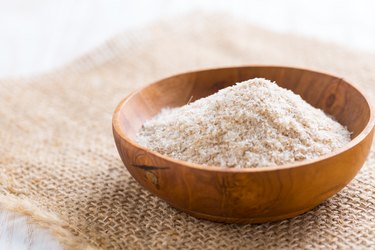
Say it again with us: Eat more fiber. You've probably heard that fiber is your friend, especially in food, but do fiber supplements like Metamucil help to lower cholesterol? Can adding bulk to your diet in the form of psyllium husk — help keep cholesterol in check? The experts weigh in.
Read more: 19 High-Fiber Foods for Better Heart and Gut Health
Video of the Day
Video of the Day
Fiber and Your Heart
According to the International Food Information Council (IFIC), sufficient daily amounts of fiber for men and women are:
- 38 grams: men under 50.
- 30 grams: men 50+.
- 25 grams: women under 50.
- 21 grams: women 50+.
By meeting these intake recommendations, a wide array of health perks can happen. According to Mayo Clinic, these can include:
- Lower cholesterol levels.
- Constipation relief and regular bowel movements.
- Reduced risk of hemorrhoids and diverticulitis.
- Blood sugar control and diminished risk of developing type 2 diabetes.
- Healthy weight.
- Reduced risk of all cancers and heart disease.
Zeroing in on your cholesterol, the IFIC says fiber, the nondigestible form of carbs found in fruits, veggies and legumes, works to reduce your cholesterol by diminishing the reabsorption of the bile acid pool in the intestines. When bile acid gets excreted instead, your liver has to draw some cholesterol from your bloodstream to make bile.
And the Mayo Clinic specifies that you want to reach for soluble fiber specifically for lowering LDL (aka bad cholesterol). You'll find soluble fiber in the likes of:
- Oats.
- Beans.
- Flaxseed.
- Citrus fruit.
- Apples.
- Oat bran.
You can also find it in — you guessed it — psyllium.
Connie Diekman, MEd, RD, a St. Louis-based food and nutrition consultant and former president of the Academy of Nutrition and Dietetics, agrees, pointing specifically to the cholesterol benefit of a psyllium husk supplement.
"Psyllium husk can help lower your LDL cholesterol," she says, and, "while foods high in soluble fiber also act to bind LDL cholesterol, taking psyllium as a supplement can further aid cholesterol reduction."
Getting Your Fiber Fill
But, notes the IFIC, only about 5 percent of Americans actually get enough daily fiber through diet alone.
Enter those psyllium husk powder supplements. Metamucil is one branded version of psyllium husk as an oral powder, according to the brand's website. You've likely heard of Metamucil (though there are many other psyllium husk powder supplements as well), and you can easily buy it over the counter.
Depending on your dietary intake, the amount of psyllium husk you need to supplement the fiber you get from foods can range from 10 to 20 grams per day, Diekman says. That's about 1 to 2 rounded tablespoons of the powder in water.
But don't overdo it right off the bat. Mayo Clinic cautions that adding too much fiber too fast can trigger some degree of abdominal bloating and gas. So if you do want to up your fiber, doing so gradually is key, as adding fiber slowly allows your gut bacteria to adjust.
The other key, adds Mayo Clinic, is the other magic word: water. Drinking plenty of water is critical because fiber works best when it soaks up water.
The More You Know
Before you speed off to the store, it's important to get the complete picture.
"Psyllium is a concentrated source of fiber, so it can irritate some people's GI tract, and it can bind or block absorption of other medications," Diekman says, "so talk with your MD before adding to your diet."
The Mayo Clinic seconds that notion, noting that because fiber supplements can lessen your body's ability to properly absorb certain medications (including aspirin), you're best off consulting with your doctor before adding a fiber supplement to your dietary routine.
And, in an ideal world, Mayo Clinic favors whole foods over fiber supplements whenever possible for getting your fiber fill, given the vitamins, minerals and nutrients these foods contain, which aren't present in the powder supplements.
- Connie Diekman, MEd, RD, LD, FADA, food and nutrition consultant; former president, Academy of Nutrition and Dietetics; author, The Everything Mediterranean Diet Book; former director, university nutrition, Washington University, St. Louis, Missouri
- Mayo Clinic: “Dietary Fiber: Essential for a Healthy Diet”
- International Food Information Council: “Fiber Fact Sheet”
- Mayo Clinic: “I Find It Difficult To Eat Enough Fruits and Vegetables. Is There Any Harm in Taking a Fiber Supplement Every Day?”
- Procter & Gamble: "Metamucil"
Is this an emergency? If you are experiencing serious medical symptoms, please see the National Library of Medicine’s list of signs you need emergency medical attention or call 911.